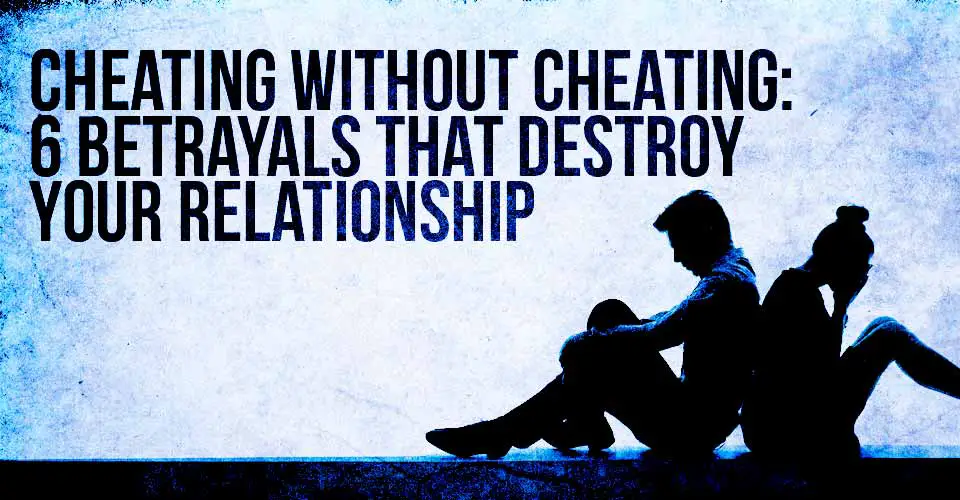Cheating Without Cheating: 6 Betrayals that Destroy Your Relationship from the Inside

Internal sabotage is as harmful to many relationships as external cheating, and causes just as many problems between humans who are otherwise committed to each other.
While external causes -fooling around or sexual involvement with someone outside of the relationship- are easier to pinpoint, that may be why these internal betrayals are just as troublesome. They’re insidious. They’re difficult to understand and often aren’t addressed until they seem too big to fix.

Here are 6 common betrayals that may be destroying your relationship from the inside:
1) Neglect
Neglect isn’t the same as abuse and that’s why it can be tough to spot until after the fact. Hindsight is, as they say, 20/20. Relationships are living, vibrant things that require everyday maintenance and care, daily nurturing. Think of your relationship as a garden: if you only maintain it when you feel like it, you will very quickly have a dead garden. You have to weed and water and fertilize regularly, sometimes daily. You have to work to maintain it. Your relationship is no different.
2) Comfort vs “letting yourself go”
Being comfortable around your significant other is essential to a happy relationship, but we all know there is a difference between a level of comfort and relaxation and abject laziness. But how do we learn to walk that line without feeling…well…uncomfortable?
One way to approach this tough one is to think about being the best version of yourself. The best version of yourself is what we all want to present to the world, and it should also be what we always present to our significant other. The best version of ourselves isn’t perfect or always happy or always anything, but even at the worst times and the most difficult moments represents who we are and what we bring to the table, whether in yoga pants and a nightshirt or a ball gown. It’s not about what you’re wearing or not, or what your weight is: it’s about being true to yourself so that you’re true to your relationship.
3) Putting the status of being in a relationship on a pedestal
We’re taught that being in a relationship as some kind of momentous achievement (and, conversely, being single as a lack of that achievement). Putting the status of being in a relationship on a pedestal rather than the quality of the actual relationship itself is a huge betrayal. What you’re saying is that the person you’re with isn’t important, it’s just important that you’re with a person.
Make sure you’re regularly checking in to make sure that you and your partner are in the best relationship you’ve ever had. If that’s not the case, how can you work to fix it? Some people refuse to even introduce social media into their relationships anymore because of the emphasis on status. Make sure you’ve got your priorities in check.
4) Using your partner
When you use your partner it shows that you aren’t willing to work on yourself. Using your partner usually manifests as blame on the other person for not making you happy when you’re not the one actually putting in the self-work to be happy in your relationship. This creates a terrible cycle of inequality and codependence that only spirals downwards. Are you worried that you might be using your partner…or being used? Check out these classic signs of a codependent relationship to find out.
5) Being right instead of being well
Codependency rears its ugly head again when we insist upon being right more often than not. Being right usually comes at a substantial price, as we often engage in shaming behaviors when we insist on being right instead of communicating proactively. As explored extensively in this great Radiolab podcast, what’s left when we’re right is usually a broken, fragmented communication meltdown that only spirals downward to the inevitable end of a relationship. Engaging in healthy communication measures -using “I” statements, clearly stating how you feel rather than accusing the other person of doing something to or because of you- is key in a functional relationship, and that means that sometimes you’re just not right. And that’s okay.
6) Expecting Your Partner to Change
This one has always personally baffled me: if you got into a relationship with this person because of who they are, why would you want them to be someone they’re not?
All humans experience change; it’s part of growth. But changing the core of your partner’s values or who they really are, their unique qualities that make them them, is not something you should ever try or expect to do. If you truly want your partner to be a different person, you don’t really actually want your partner to change. You want a different partner, and you probably oughta act on that.


